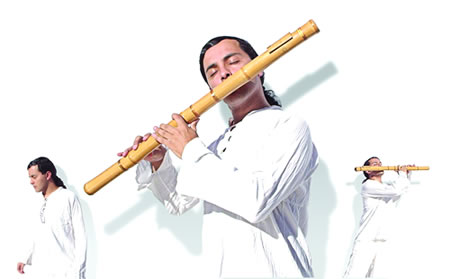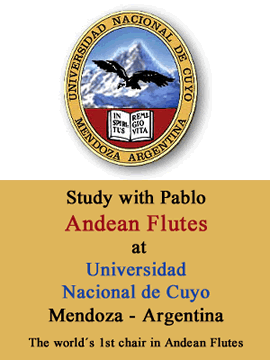
World Flutes Master

Take care of our enviroment

comprar

Peace web theme set courtesy of Crystal Cloud Graphics web set icon
Crystal Cloud Graphics
Crystal Cloud Graphics

Tabor Pipe
The three-holed pipe is a form of the folk pipe which is usually played with one hand, while the other hand plays a tabor or other drone instrument, such as a bell or a psalterium (string-drum).
A minstrel playing tabor and pipe
In English this instrument is properly called simply a pipe, but is often referred to as a tabor pipe to distinguish it from other instruments.
The tabor pipe has two finger holes and one thumb hole. In the English tradition, these three holes play the same notes as the bottom three holes of a tin whistle, or tone, tone, semitone. Other tabor pipes, such as the French galoubet, Picco Pipe, the Basque txistu, the Aragonese chiflo or the Andalusian pito rociero, are tuned differently. A much larger 3-hole pipe, the fujara, is played in Slovakia.
The pipe and tabor was a common combination throughout Europe, during the mediŠval period, and remains popular in some parts of Europe and the Americas today.
The English pipe and tabor had waned in popularity, but had not died out before a revival by Morris dance musicians in the early 20th century.
Traditionally made of cane, bone, ivory, or wood, today pipes are also available made of metal and of plastic.
The three-holed pipe is a form of the folk pipe which is usually played with one hand, while the other hand plays a tabor or other drone instrument, such as a bell or a psalterium (string-drum).
A minstrel playing tabor and pipe
In English this instrument is properly called simply a pipe, but is often referred to as a tabor pipe to distinguish it from other instruments.
The tabor pipe has two finger holes and one thumb hole. In the English tradition, these three holes play the same notes as the bottom three holes of a tin whistle, or tone, tone, semitone. Other tabor pipes, such as the French galoubet, Picco Pipe, the Basque txistu, the Aragonese chiflo or the Andalusian pito rociero, are tuned differently. A much larger 3-hole pipe, the fujara, is played in Slovakia.
The pipe and tabor was a common combination throughout Europe, during the mediŠval period, and remains popular in some parts of Europe and the Americas today.
The English pipe and tabor had waned in popularity, but had not died out before a revival by Morris dance musicians in the early 20th century.
Traditionally made of cane, bone, ivory, or wood, today pipes are also available made of metal and of plastic.










